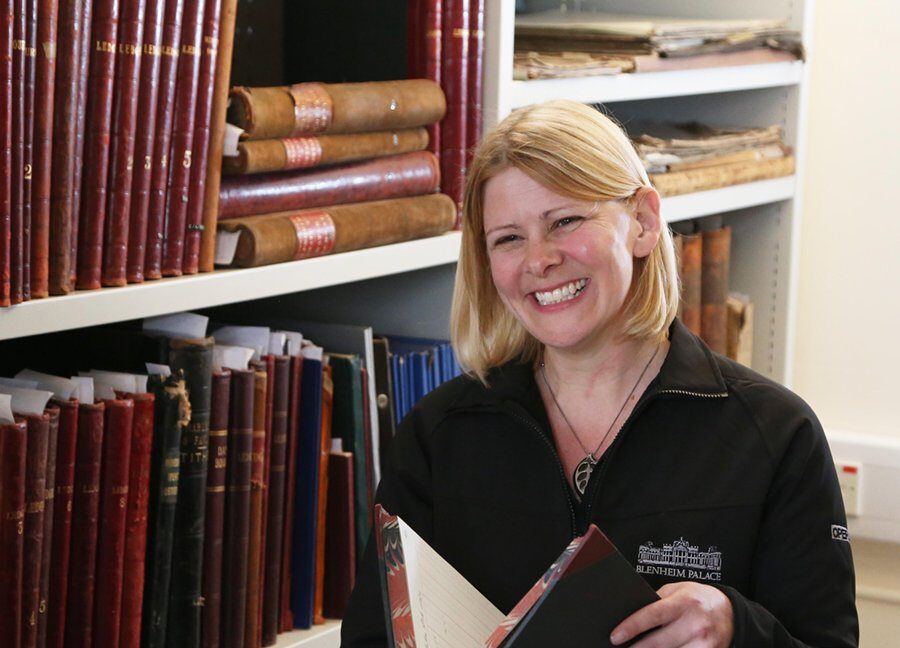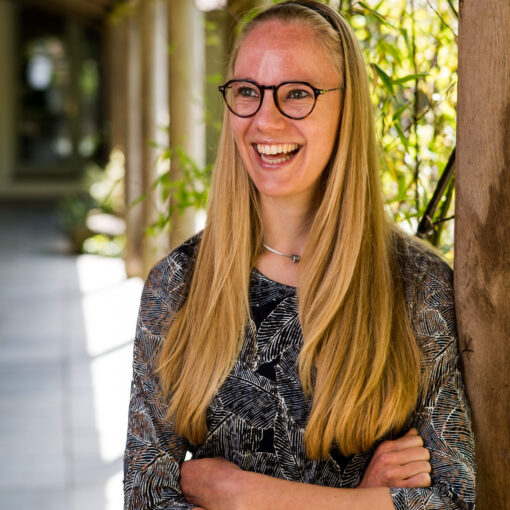PhD in Classics, Royal Holloway (2018)
| Archivist | |
|---|---|
| Blenheim Palace Heritage Foundation | |
Year entered into a non-academic position: 2014
Job highlight: The privilege of having access to historic material which is not in the public domain.
My research training set me up to…: Understand researchers’ needs and catalogue archival material accordingly, to catalogue material from a non-biased or interpretive stance, and to write press releases and exhibition display boards.
Left academia after: Part-time PhD while working.
What’s your background?
I studied a BA in Classics at St Anne’s College, University of Oxford.
Why did you move away from academia?
Family commitments during my PhD prevented me from taking on teaching roles during my research and gaining publication experience. This, combined with the financial constraints of having self-funded all 4 of my degrees, meant that an academic career was not viable.
Is there anything you miss about academia?
I miss the independence of working according to my personal interests. Research is now in response to other people’s work, whether it be academic, local history interests, or an internal inquiry such as historic background for media pieces or details for visitor experiences such as exhibitions and tours.
How did you get this job? Did you face any challenges when considering a move away from academia or applying for the role?
I started working for Blenheim in a freelance capacity for 9 months on a specific project creating an electronic catalogue. A year later, I applied for the role of part-time Assistant Archivist. The biggest challenge was the lack of professional qualification, which is a requirement of this role in most institutions. I overcame this by completing a graduate diploma in Archives and Records Management during the first two years of employment.
What motivated you to/why did you choose the sector you transitioned into?
This sector has given me the opportunity to apply many of the skills I developed during my academic pursuits.
I have also been able to learn new skills and see the result of my work in the changes that I have introduced in the Archives. For example, we have now established a more formal Archive and are developing the service to encompass outreach projects, greater access to researchers, and engagement with stakeholders.
Blenheim is a beautiful setting in which to work and its history is fascinating. It is a great privilege to preserve history and bring it alive by sharing the heritage of Blenheim, supporting the local community and enhancing visitor experiences through my work.
Did you think you had the skills required for your current position before you started? Were you right?
My role has changed overtime as I have progressed from Assistant Archivist to Archivist and has consequently required adapting the way in which I work. I was quick to apply my transferable skills and I have had access to training to carry out my daily tasks, such as people management, in addition to keeping abreast of current archival practices.
How did your PhD prepare you for your current job? For example, what were the transferable skills that you developed during your PhD that are most relevant to your current job?
- A genuine interest in history and in preserving records for posterity, plus an understanding of the purpose which archives serve
- Project management skills, alongside written and oral communication skills
- Maintaining a very high standard of work with attention to detail and accuracy, and experience of research processes
- Self-motivation, with the ability to use my own initiative, work alone, prioritise work, and achieve targets
Did you have any preconceptions about your sector that proved to be wrong?
I had thought that there would be more of an opportunity for personal research and work with archival material. There may be a possibility for preparing publications in the future, but certainly now my attention is devoted elsewhere. I hadn’t anticipated that so much time would be dedicated to cataloguing material which covers interesting private correspondence and more mundane receipts.
Can you describe a typical week in your job?
I am responsible for developing and implementing systems and procedures for the proper management of Blenheim’s heritage and records, ensuring that the organisation’s historically valuable documents and modern records are preserved and organised to the highest professional standards. This involves working with many different stakeholders, including colleagues in marketing and other areas, trustees, and donors. My role is very varied, and involves cataloguing archival material, writing reports, giving talks, and strategic planning. I also have ample opportunity to undertake professional development and advise colleagues on new professional standards and legislation.
What is the workplace culture like? Please include comments on work-life balance, flexibility, remote working?
Blenheim has a code of conduct and a set of values which were devised to help all staff across the estate to understand the drivers of the business, with the aim that they will be embraced across the board to reinforce how all teams work together as a part of the ‘Blenheim Family’.
Our CEO hosts regular staff briefings to update everyone on the progress and challenges which Blenheim has had to overcome. He has continued Q&A forums remotely during the Covid-19 pandemic when the Palace has been closed. There are a variety of avenues of support available should challenges arise both in the workplace and at home, and Blenheim is committed as a business to help people if and when these arise. As well as speaking with line managers and HR, there is also an Employee Assistance service which offers online and telephone help providing confidential support and counselling and advice. There are lots of staff benefits including free tickets to events, annual passes for family, a Christmas tree, staff parties, quizzes, and outings.
My hours are flexible and there is the opportunity to work from home (for example on policies), though there are times when I have to be in the office (for example to supervise researchers or catalogue material).
Do people with a PhD frequently get hired in the company/sector?
I am the only member of staff with a PhD, but this is by coincidence rather than intention.
What are your favourite parts of your job?
The privilege of having access to historic material which is not in the public domain; bringing history alive through collaborative work with the Marketing department and enhancing visitor experiences; and organising material so that it is available for current and future use.
What are your reflections on your career path?
I have no regrets in the decisions I have made relating to my career. I was privileged to have the opportunity to complete a PhD and have the support of my family to pursue my academic interests. The job at Blenheim came at the right time to suit my employment wishes as well as being able to balance work with family commitments.
Do you have any advice for current graduate students and postdocs considering a career outside of academia?
- Gain experience of working in the profession that you are interested in
- Join relevant professional organisations and sign up to newsletters
- Keep abreast with current practices in the industry
- Be clear about the skills which the job will require and either complete a course in advance or find an employer who is committed to career development
- Network
- Be confident that the skills you have developed during research are applicable and transferable to most jobs
What do you know now that you wish you’d known when exploring a transition?
Not to be intimidated by having less experience in the industry than other candidates, and to have had confidence that the skills I developed during my research are largely applicable to this role.
Can you recommend any relevant resources, organisations or events that might help somebody new to the sector find out more about it?
Join the Archives and Records Association.
Blenheim Palace is the home of the 12th Duke and Duchess of Marlborough and the birthplace of Sir Winston Churchill. This National Treasure houses some of the finest antique collections in Europe and boasts over 300 years of history to discover. Explore this World Heritage Site set in more than 2000 acres of ‘Capability’ Brown landscaped Parkland and tour the array of Formal Gardens, or take the miniature train to the family-friendly Walled Garden. Blenheim Palace is not only an iconic part of history, but also a living, changing experience with a wealth of events, themed trails and tours, and exhibitions throughout the year.
As a World Heritage Site, we are able to offer a unique and stunning place to work and are passionate about providing an environment for our employees to develop their skills, try new ways of learning and encouraging their talents to flourish. We employ great people who enjoy working together in the Palace and across the Estate, welcoming our visitors and connecting with local communities. We value our employees and the vital part they play in the prosperity and conservation of this special World Heritage Site for future generations.
We strive to ensure that our workplace is a happy and rewarding environment for everyone, and we have an incredibly talented and committed staff who all share our values.
More information can be found at: https://www.blenheim.org/careers/






